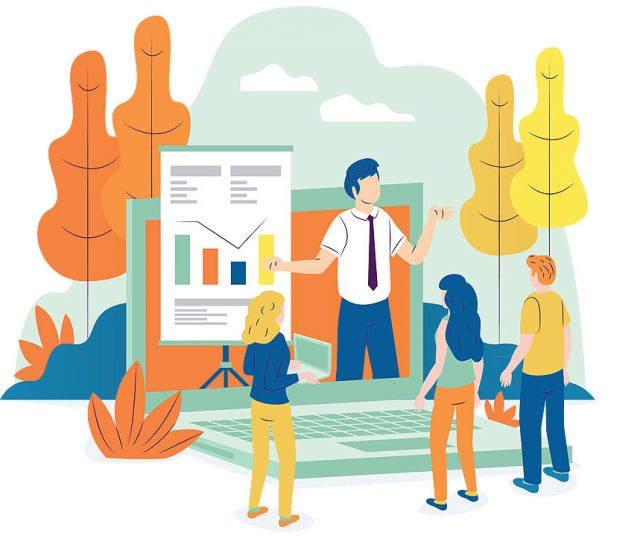
Article by: Susan L. Dimacali
Never before in the last 50 years has there been any disruption in the school system as compelling and life-changing! As a result of the pandemic, schools were closed and face-to-face classes prohibited. The traditional academic fundamentals as well as the business of running a school ceased, and school leaders had to grapple with a new reality.
At the onset of the pandemic, Asia Pacific College (APC) took the opportunity to change course. It immediately assuaged the fears and apprehensions of the students and parents on the impact of the closure on the school system. Significantly, they lost confidence on the ability of the schools to deliver the promise of education.
Then, APC resolved to adopt a new mode of teaching and learning — creating Online Course Packs, intensifying Project-Based Learning as a method to practice the skills and derive proof of competence gained. Projects came from the industry, hence APC’s brand of “Real Projects-Real Learning” was never before made more relevant.
For APC, online learning was the only option given the prolonged restrictions on face-to-face classes for School Year 2020-2021. Digital transformation had to come from all fronts and work with synchronicity to ensure that no one would be out of step at any time including the students and their parents.
The first innovation was the students’ use Microsoft 365 accounts online, and attending online classes on Microsoft Teams, which APC reinvented as its learning management system. APC also partnered with Globe Telecom to supply students who needed connectivity with a WiFi Kit and a special data load that is restricted from accessing non-academic related websites. This special data load would be automatically loaded onto the students WiFi modems for the next 12 months. All these were done at no additional cost to the students and their parents. This would enable all students to now connect to MS Teams.
The most compelling innovation was the re-invention of the laboratory that allowed students to perform laboratory work at home. Hands-on laboratory exercises meant different things to different courses, and they all had to be accommodated.
For laboratory work which used certain software like SAP or Visual Paradigm, vendors were contacted and asked if they hosted versions of their software. Some did, and APC signed up with them.
Some laboratory environments meant using a combination of software tools, like courses on Analytics that utilize Weka and Tableau. Our Cybersecurity courses use Kali Linux and Wireshark, amongst others. Azure Lab Services were used for these requirements.
Other laboratory environments required special hardware like a video card and long hours of usage due to the complexity of activities. To provide such services, APC signed-up with NComputing for the latest Verde Remote Desktop system. This enabled the Arts students to use powerful PCs with video cards and work long hours without unnecessarily accumulating huge usage charges.
Mobile phones are popular among students, thus, we opted to use software which are accessible by mobile phone for the laboratory work, like, for instance, 2D animation and electronics design circuits.
These significant innovations to meet the challenges of the pandemic enabled APC to transform the physical school into a virtual learning institution. It found the silver-linings, or opportunities to improve class engagement and deliver promised learning outcomes, not only because of the pandemic, but also the opportunities that arose despite the pandemic.
Early on, the first silver-lining realization was that online learning can be far more effective and enriching than in-classroom learning. The challenge was to enable more teaching and learning support and make resources more available by capitalizing on online platforms and infrastructure.
Realizing that this pandemic will drastically change the nature of work, relying more on IT as the enabler, we thought about accelerating the experience of the future skill sets through intensive project development involvement and engagement. As students work in teams, they work with a multitude of mentors across the globe. Moreover, they work with real project owners who become the final judge of their work.
Hence, at APC, the limitation of the physical classroom no longer exists, as there lies inexhaustive possibilities of enhanced teaching and learning in the virtual space.
This article reflects the personal opinion of the author and does not reflect the official stand of the Management Association of the Philippines or MAP. To read the full article, please visit https://www.bworldonline.com/going-virtual-during-the-pandemic/.
The Management Association of the Philippines (MAP) is a 68-year-old management organization whose over 1,000 members represent a cross-section of CEOs, COOs and the other top management practitioners from the largest local and multinational companies operating in the Philippines. Ms. Dimacali is the co-Chair of the MAP Communications Committee.
Susan L. Dimacali is Co-Chair of the MAP Communications Committee, Partner and Director of Auracle Wellness Corp., Director of APC and NU, and VP of the Filipina CEO Circle.






